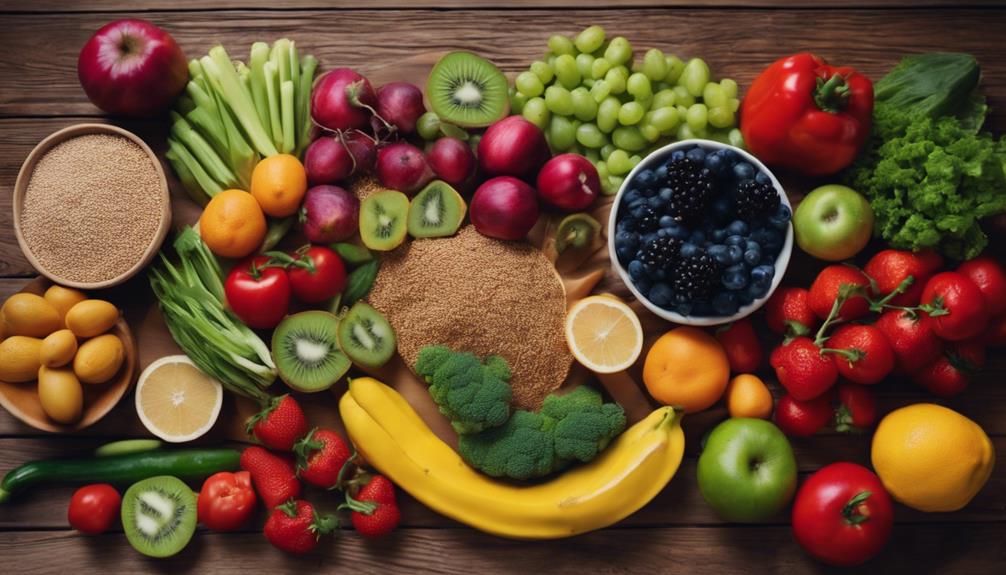To achieve the best eating lifestyle for well-being, prioritize a balanced diet rich in nutrient-dense foods, whole grains, and healthy fats. Focus on high-fiber carbohydrates, lean proteins, and a variety of fruits and vegetables. Incorporate healthy fats from sources like avocados and nuts, and limit added sugars and salt. Develop mindful eating habits by savoring each bite, eating slowly, and avoiding distractions. Make smart food choices by reading labels carefully and practicing portion control. By following these essentials, you'll greatly reduce your risk of chronic diseases and enhance your well-being. Continue on this path to discover more ways to fuel your body for a healthier, happier you.
Key Takeaways
- Prioritize whole grains, fruits, and vegetables to provide sustained energy and essential nutrients for optimal well-being.
- Incorporate lean proteins like fish and legumes to support heart and brain health with quality protein and low saturated fat.
- Make healthy fats from avocados, nuts, and olive oil a part of your diet to support heart health and brain function.
- Develop a balanced diet plan with a variety of nutrient-dense foods and healthy habits, such as portion control and mindful eating.
- Stay hydrated by drinking 6 to 8 glasses of fluids daily, choosing water, milk, and lower sugar drinks to support overall health.
Healthy Eating Essentials
To establish a solid foundation for a healthy eating lifestyle, focus on incorporating these essential components into your daily diet. Start by making high-fiber starchy carbohydrates like potatoes, bread, rice, pasta, and cereals a staple in your meals. These foods provide sustained energy and essential nutrients for overall well-being.
Aim to eat at least 5 servings of fruits and vegetables daily to reap the benefits of crucial vitamins, minerals, and antioxidants. Incorporate lean proteins like fish into your diet, and don't forget to include oily fish for a boost of omega-3 fatty acids, which support heart and brain health.
Opt for whole grains over refined grains to benefit from fiber, vitamins, and minerals essential for digestion and overall health. By making these healthy eating essentials a priority, you'll be well on your way to a balanced diet that supports your overall health and reduces the risk of chronic diseases.
Nutrient-Dense Food Options

By prioritizing nutrient-dense food options, you'll be fueling your body with the essential vitamins, minerals, and antioxidants it needs to thrive. Fruits, vegetables, and whole grains are excellent sources of these nutrients, providing a solid foundation for overall well-being. These foods are packed with vitamins, minerals, and antioxidants that support immune function, energy levels, and cell growth.
In addition to these nutrient-dense foods, incorporating lean proteins like fish and legumes into your diet can provide quality protein sources with low saturated fat content. Healthy fats from sources like avocados, nuts, and olive oil support heart health and brain function. Dairy products like Greek yogurt and milk are also important, contributing to calcium intake for bone health.
Balanced Diet Plans

You'll be more likely to stick to a healthy eating lifestyle if you develop a balanced diet plan that incorporates a variety of nutrient-dense foods and healthy habits.
A balanced diet plan should include a range of fruits, vegetables, whole grains, lean proteins, and healthy fats to promote overall well-being. Following guidelines like the Eatwell Guide can help make sure you're getting the right balance of nutrients.
Healthy eating habits are also important, such as practicing portion control, meal planning, and mindful eating.
Additionally, don't forget to stay hydrated by drinking 6 to 8 glasses of fluids daily, opting for water, milk, and lower sugar drinks.
Mindful Eating Habits

Developing mindful eating habits can enhance your overall dining experience, leading to healthier food choices and a more balanced relationship with food. By savoring each bite, you'll pay attention to the flavors and textures of your food, making mealtime more enjoyable.
Eating slowly also helps with portion control, reducing the likelihood of overeating. Avoid distractions while eating, such as TV or your phone, to improve satisfaction with your meals. Listen to your hunger cues and stop when you're comfortably full, rather than stuffed.
Expressing gratitude for the food you eat can also enhance the experience and promote mindful eating habits. By adopting these habits, you'll make healthier food choices, improve digestion, and overall well-being.
Mindful eating is about being present and aware of your food, allowing you to develop a more positive relationship with eating. By incorporating these habits into your daily life, you'll reap the benefits of a healthier, happier you.
Smart Food Choices

Make smart food choices by incorporating a variety of nutrient-dense foods into your diet, including a rainbow of fruits and vegetables, whole grains, and lean proteins. Eating a balanced diet provides your body with the necessary fuel to function at its best.
Here are some key considerations to keep in mind:
- Choose healthy fats: Avocados and nuts are great sources of healthy fats, while limiting added sugars and salt in your meals is essential.
- Practice portion control: Using smaller plates and mindful eating techniques can help you manage your calorie intake.
- Read labels carefully: Monitor hidden sugars, unhealthy fats, and portion sizes to make informed food choices.
Frequently Asked Questions
What Is the Best Diet to Live a Healthy Life?
To live a healthy life, you should focus on nutrient-dense foods like fruits, veggies, whole grains, lean proteins, and healthy fats, which provide essential vitamins, minerals, and antioxidants for overall well-being.
Which Is the Best Food Choice for a Healthy Lifestyle?
"For a healthy lifestyle, your best food choice is a balanced mix of fruits, veggies, whole grains, lean proteins, and healthy fats like avocados and nuts, limiting saturated fats and added sugars."
What Is Good Food for Wellbeing?
'What's the secret to discovering your best self? For you, good food for wellbeing means incorporating a variety of fruits, veggies, whole grains, lean proteins, and healthy fats like avocados and nuts into your daily diet!'
What Diet Is Best for Overall Health?
When it comes to choosing the best diet for overall health, you'll find that the Flexitarian, DASH, MIND, Volumetrics, and Mayo Clinic diets are all top contenders, each offering unique benefits for your well-being.
Conclusion
As you begin your journey to a healthier you, remember that the best eating lifestyle is a puzzle, and every nutritious choice is a piece that falls into place.
With a balanced diet plan, mindful eating habits, and smart food choices, you'll be weaving a tapestry of wellness that's as vibrant as a rainbow and as sturdy as a mountain.
Every bite is a step closer to a life that's full, rich, and deliciously yours.








